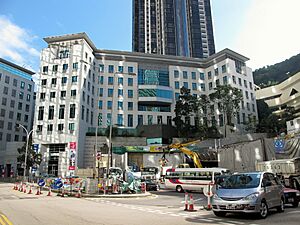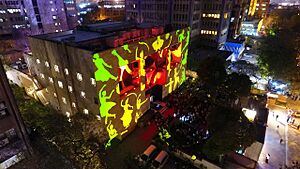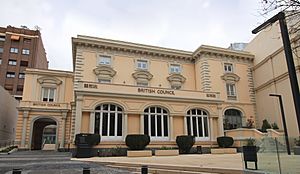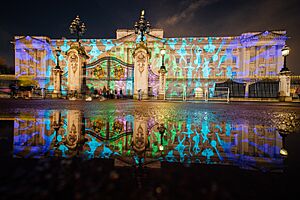British Council facts for kids
 |
|
| Founded | 1934 |
|---|---|
| Founder | British government |
| Type | Cultural institution |
| Headquarters | 1 Redman Place, Stratford, London E20 1JQ, England, United Kingdom |
|
Area served
|
Worldwide |
| Product | British cultural and language education |
|
Key people
|
Paul Thompson (Chair) Scott McDonald (Chief Executive) |
|
Revenue (2020–21)
|
£924,965,472 |
| Expenses (2020–21) | £1,015,114,434 |
| Website | www.britishcouncil.org |

The British Council is a UK organisation that helps people around the world learn about British culture and education. It works in over 100 countries. Its main goals are to teach the English language (and sometimes the Welsh language in Argentina), share British culture, and encourage countries to work together in education, science, and technology.
The British Council is a special type of charity. It is supported by the UK government's Foreign, Commonwealth and Development Office. Its main office is in Stratford, London. The current leader is Paul Thompson, who is the Chair, and Scott McDonald, who is the Chief Executive.
Contents
How the British Council Started
The British Council has a long and interesting history:
- 1934: Officials from the British government created a group to help teach English abroad and share British culture. They first called it the "British Committee for Relations with Other Countries."
- 1936: The name was officially shortened to the British Council.
- 1938: The British Council opened its first offices in other countries. These were in Bucharest (Romania), Cairo (Egypt), Lisbon (Portugal), and Warsaw (Poland). The offices in Portugal are still open today, making them the oldest ones.
- 1940: King George VI gave the British Council a special document called a Royal Charter. This document officially gave the British Council the job of spreading knowledge about the UK and the English language, and building stronger cultural ties with other countries.
- 1942: The British Council started a big project to promote British culture, especially music. They recorded famous pieces by British composers to share with the world.
- 1944: After Paris was freed during World War II, the British Council quickly reopened its office there. They brought famous theatre groups and writers to perform and speak.
- 1946: The British Council put together an exhibition of traditional British crafts. This collection travelled to Australia and New Zealand to show off British skills.
- 1948: A famous theatre group, the Old Vic Theatre Company, went on a tour of Australia and New Zealand. The tour starred well-known actors like Laurence Olivier and Vivien Leigh. They performed for over 300,000 people!
- 2007: There were some challenges in Russia, and the British Council had to close some of its offices there for a while.
- 2011: The British Council office in Kabul, Afghanistan, was attacked. Sadly, some people lost their lives, but no British staff were harmed. The office later moved to a safer location within the British Embassy.
- 2013: An attempted attack happened near the British Council office in Tripoli, Libya. Thankfully, no one was seriously hurt at the British Council.
How the British Council Works
The British Council is a charity that works to build connections between the UK and other countries. It is supported by the UK government. Its main office is in Stratford, London.
The British Council works in over 100 countries. It aims to:
- Help people learn more about the UK and the English language.
- Encourage cooperation in education, science, and culture.
- Give people access to UK education, skills, and culture.
- Connect important people from other countries with the UK's culture and opportunities.
What the British Council Does
English Language and Exams
The British Council helps millions of people learn English.
- They have teaching centres in more than 50 countries where people can learn English face-to-face.
- They help over three million people take UK exams each year in many cities around the world.

- The British Council also helps run the global IELTS English language test. This test is used by people who want to study or work in English-speaking countries.
Online Learning
In 2014, the British Council started its first free online course, called "Exploring English: Language and Culture." Over 230,000 people joined this course to improve their English.
English for Peacekeepers
The British Council has a special project called "Peacekeeping English." It helps military and police personnel in different countries improve their English skills. This helps them work better together in peacekeeping missions.
Study Abroad Programmes
Education UK
The British Council runs a website called Education UK. This website helps international students find information about studying in the UK. It lists courses, scholarships, and gives advice about living in the UK.
Erasmus+
From 2014 to 2020, the British Council helped manage the Erasmus+ programme in the UK. This programme gave young people opportunities to study, train, or volunteer abroad.
Connecting Schools
The British Council has a programme called "Connecting Classrooms." This programme helps schools in different countries work together. Over 16,000 schools have joined this programme, and many teachers have received special training.
Arts and Culture
The British Council uses arts and culture to connect people.
ACCELERATE
ACCELERATE was a programme that helped talented Aboriginal and Torres Strait Islander artists and creative people in Australia develop their leadership skills. It ran from 2009 to 2016.
UK-India Year of Culture
In 2017, the British Council helped celebrate the UK-India Year of Culture. A special event was held at Buckingham Palace, where a peacock, India's national bird, was projected onto the palace walls.
fiveFilms4freedom
Since 2015, the British Council has hosted fiveFilms4freedom. This is a free online film festival that shows LGBT films. It's the first global online festival of its kind and helps spread the message that love is a human right. Millions of people in many countries have watched these films.
Shakespeare Lives
In 2015, the British Council launched a global programme called "Shakespeare Lives." This celebrated the life and work of William Shakespeare on the 400th anniversary of his death. They worked with many famous UK arts organisations.
Selector Radio
Selector Radio is a weekly radio show produced for the British Council. It plays a wide range of UK music, from grime to indie to dance. The show features interviews with artists and live performances. It's broadcast in over 30 countries and helps a global audience discover new UK music.
Cultural Exchange with North Korea
The British Council has been running a teacher training programme in North Korea since 2001. They also signed an agreement in 2014 to encourage cultural and educational exchange with the country.
Other Activities
Young Creative Entrepreneur Awards
The British Council also runs awards for young creative entrepreneurs. These awards recognise and support talented people in creative fields like publishing, design, and music.
Leaders of the British Council
Many important people have led the British Council over the years. Here are some of the Chairs:
- 1934–37 Lord Tyrrell
- 1937–41 Lord Lloyd
- 1941–45 Sir Malcolm Robertson
- 1946–55 Sir Ronald Adam
- 1955–59 Sir David Kelly
- 1959–67 Lord Bridges
- 1968–71 Lord Fulton
- 1971–72 Sir Leslie Rowan
- 1972–76 Lord Ballantrae
- 1977–84 Sir Charles Troughton
- 1985–92 Sir David Orr
- 1992–98 Sir Martin Jacomb
- 1998–2004 Baroness Kennedy of The Shaws
- 2004–09 Lord Kinnock
- 2010–16 Sir Vernon Ellis
- 2016–19 Christopher Rodrigues
- 2019–23 Stevie Spring
- 2024–present Paul Thompson
Locations Around the World
The British Council has offices in many countries, divided into seven main regions:
Americas
- Argentina
- Brazil
- Canada
- Chile
- Colombia
- Cuba
- Jamaica
- Mexico
- Peru
- Trinidad and Tobago
- Uruguay
- USA
- Venezuela
East Asia-Pacific
- Australia
- Brunei
- Cambodia
- China
- Hong Kong
- Indonesia
- Japan
- South Korea
- Malaysia
- Myanmar
- New Zealand
- Philippines
- Singapore
- Taiwan
- Thailand
- Vietnam
Europe
- Albania
- Austria
- Belgium
- Bosnia and Herzegovina
- Bulgaria
- Croatia
- Cyprus
- Czech Republic
- Estonia
- France
- Germany
- Greece
- Hungary
- Ireland
- Italy
- Latvia
- Lithuania
- Malta
- Montenegro
- Netherlands
- North Macedonia
- Norway
- Poland
- Portugal
- Romania
- Russia
- Serbia
- Slovenia
- Slovakia
- Spain
- Switzerland
- Ukraine
- United Kingdom
West Asia and North Africa
- Armenia
- Azerbaijan
- Egypt
- Algeria
- Bahrain
- Georgia
- Iraq
- Jordan
- Kuwait
- Lebanon
- Libya
- Kazakhstan
- Morocco
- Oman
- Palestine
- Qatar
- Saudi Arabia
- Syria
- Tunisia
- Turkey
- United Arab Emirates
- Uzbekistan
- Yemen
South Asia
- Bangladesh
- India
- Nepal
- Pakistan
- Sri Lanka
Sub-Saharan Africa
- Botswana
- Cameroon
- Eritrea
- Ethiopia
- Ghana
- Kenya
- Malawi
- Mauritius
- Mozambique
- Namibia
- Nigeria
- Senegal
- Sierra Leone
- South Africa
- South Sudan
- Sudan
- Tanzania
- Zambia
- Zimbabwe
- Rwanda
- Uganda
See also
 In Spanish: British Council para niños
In Spanish: British Council para niños
- Cultural diplomacy
- Public diplomacy
- Teaching English as a Foreign Language (TEFL)




